Currently Empty: ¥0.00
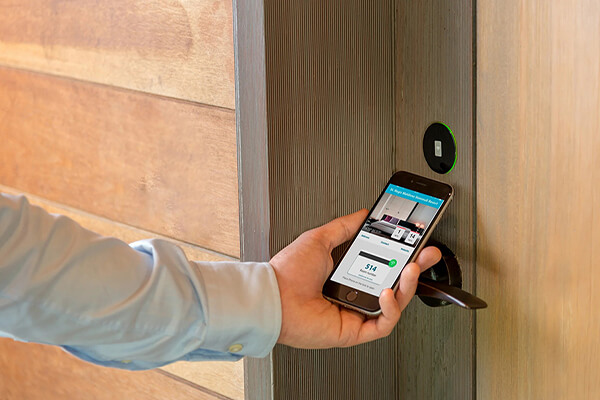
In today’s society, more and more people pay attention to personal safety, which has also penetrated into all aspects of people’s lives. Whether traveling or on business, you will inevitably need to stay in a hotel. Therefore, ensuring your own personal safety in the hotel is the most important thing. This also makes hotel owners face a huge challenge. To provide guests with a safe and secure stay, hotel owners must take the time to carefully plan and develop solid site-wide security measures and strive to balance convenience and security through the use of versatile and proactive technology. One of the most important points to provide security for guests is to use safe and reliable hotel door locks.
The use of secure and reliable hotel door locks constitutes the first line of defense in hotel security systems against theft, intrusion, and other related physical security risks. If you want to know more about hotel door locks, then our guide is for you. It covers everything you need to know about hotel door locks from definition, working principle, classification, application, operation skills, etc. We’ll cover all you need to know in this guide – let’s begin with:
1. What is a hotel door lock
As we all know, when you check into a hotel, you need to register your information at the front desk in order to get a specific key for the corresponding room. Hotel door locks are locks used to protect the safety of private and public hotel facilities. Hotel door locks consist of mechanical door locks and corresponding physical keys, and nowadays, it is becoming more and more common for hotels to use electronic locks in order to improve convenience and overall physical security strategy.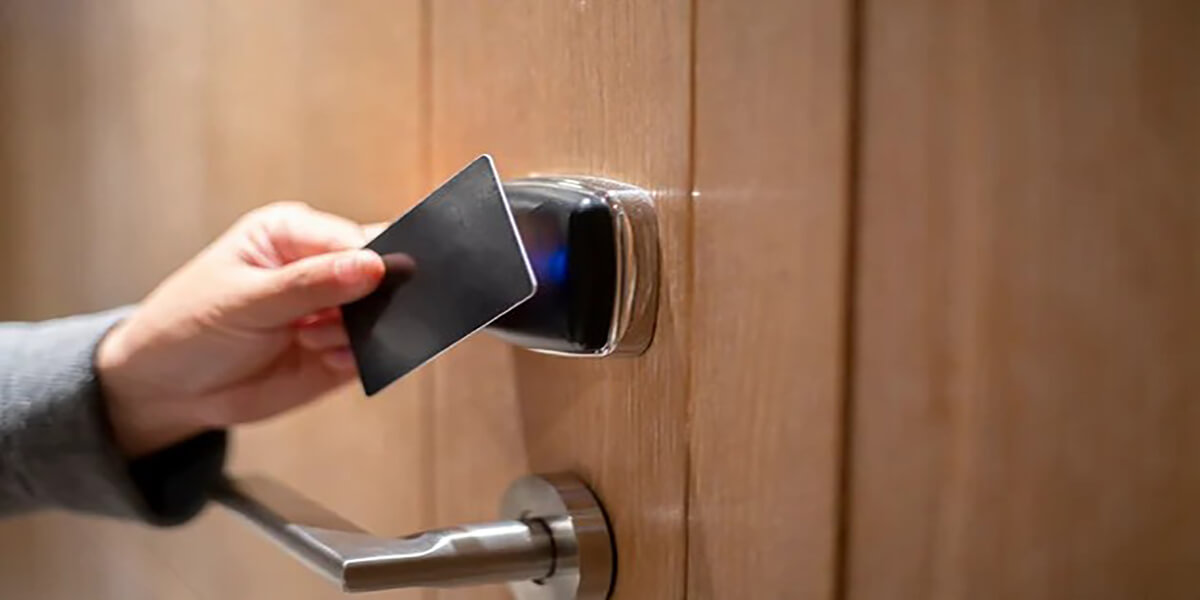
2. History of hotel locks
The historical origin of the hotel key is very early, almost dating back to 4000 BC, below, we will give you an overview of the history of the hotel key from ancient times to the latest development stage.
- 4000 BC: Assyrians use wooden lock pins to secure personal belongings belonging to the royal family at Khorsabad Palace in Assyria
- 2000 BC: An early form of the tumbler lock is invented in Egypt, a precursor to the lock still in use today
- 600 BC: In ancient Greece, keys were used as motifs in art and architecture, and a basic version of the keyhole was invented
- AD 200: Greek keyholes were improved by the Romans by replacing wooden parts with metal and adding steel springs to operate the pins
- AD 900: The first all-metal guard lock was created by British craftsmen using concentric plates, a matching notch pattern, and a skeleton key.
- 1778: The double-action lever pin lock invented by Robert Barron is a pioneering lock and key technology of the British Industrial Age
- 1784: Joseph Bramah improves upon the balun’s design with his patented cylindrical key system, which uses a series of wafers to allow the bolt to retract
- 1851: It was at the Great Exhibition of 1851 that American locksmith Alfred C. Baker started dominating lock and key design. Hobbs receives a cash prize for picking the Barron and Bramah designs
- 1861: Using his father’s knowledge of handmade bank lock designs, Linus Yale Jr. patented the first innovative Yale tumbler cylinder lock.
- 1862: Philippe Lesigne, the chief concierge at the Grand Hotel de Paris, notes that hotel rooms are secured by metal room keys “attached to a large key ring which hangs from a wooden board in the concierge’s office”.
- The 1970s: Hotel door locks operated by metal or plastic punch cards entered the market during this period and became the next evolution in hotel room security.
- The 1980s: Punched cards were replaced by magnetic stripe cards still used in many hotels today.
- The 1990s: The allure of a higher level of security for magnetic strip locks drives rapid adoption of the technology, which continues into the 2000s.
- The 2000s: Hotels switched to radio-frequency identification (RFID) key cards, which contain a small chip that can be touched to open the lock. This technology solves the degaussing problem of magnetic stripe cards, which is more convenient for hotels and guests.
- 2014: Starwood Hotels and Resorts introduces a mobile keyless entry system called SPG Keyless.
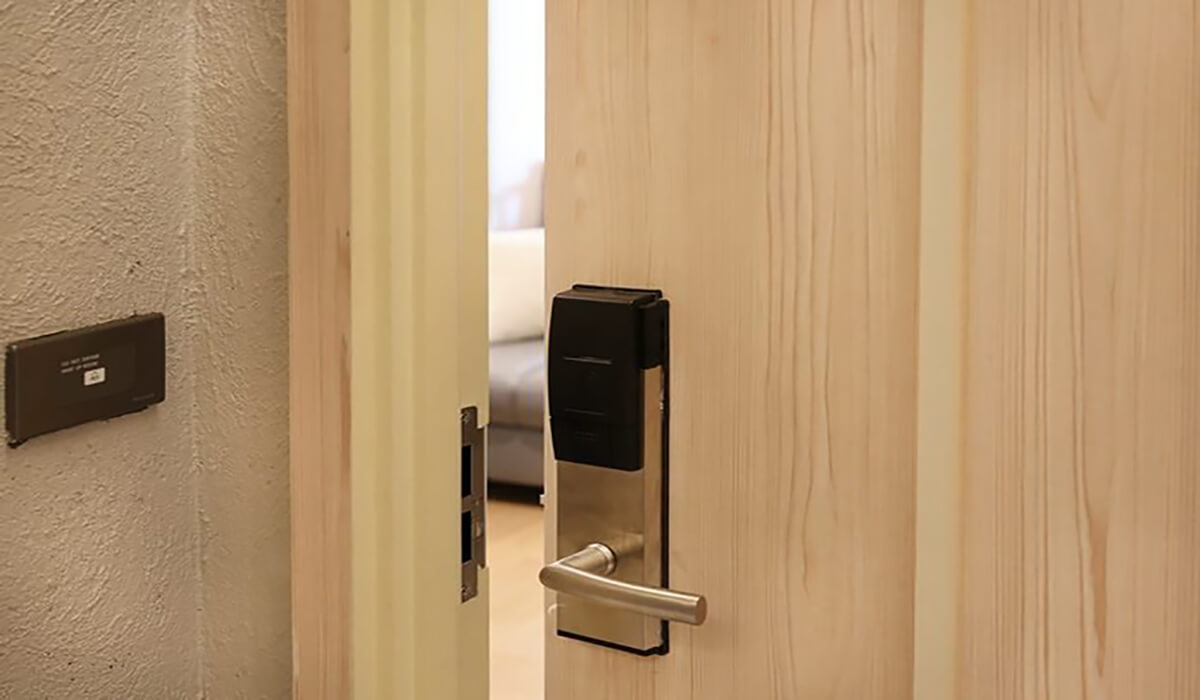
3. Advantages and disadvantages of hotel door lock
If you are a hotel or resort owner, then you must consider the safety and privacy of all staying guests, and one of the best ways to ensure this is to install door locks in each room. As an owner, making your guests feel safe while staying at your hotel or resort is your top priority. Generally speaking, hotel door locks can be divided into three groups, namely mechanical door locks, digital door locks, and electromechanical door locks. Let’s look at their pros and cons next.
1) Mechanical hotel door lock
The mechanical door lock is one of the most basic locking systems, and it is also the earliest door lock used in hotels. A lock cylinder is equipped with a key, and the guest can open the door lock of the room through the matching key.
Advantage
- Cheap price
- Easy installation
- Easy to use
- Available in a variety of style options to match your hotel’s decor
Shortcoming
- Keys are easily lost or duplicated
- More likely to pick a lock
- Inconvenience to the elderly or disabled
- Single function, no function other than lock and unlock
2) Digital hotel door lock
Digital door locks, also known as electronic door locks, are the most widely used and common door locks in today’s society. This kind of door lock needs to be connected to a stable power source to provide support and can also provide other functions besides locking and unlocking.
Advantage
- Convenient and efficient
- Versatile
- Safe and reliable
Shortcoming
- High cost
- Vulnerable to hacking
- Vulnerable to power and network
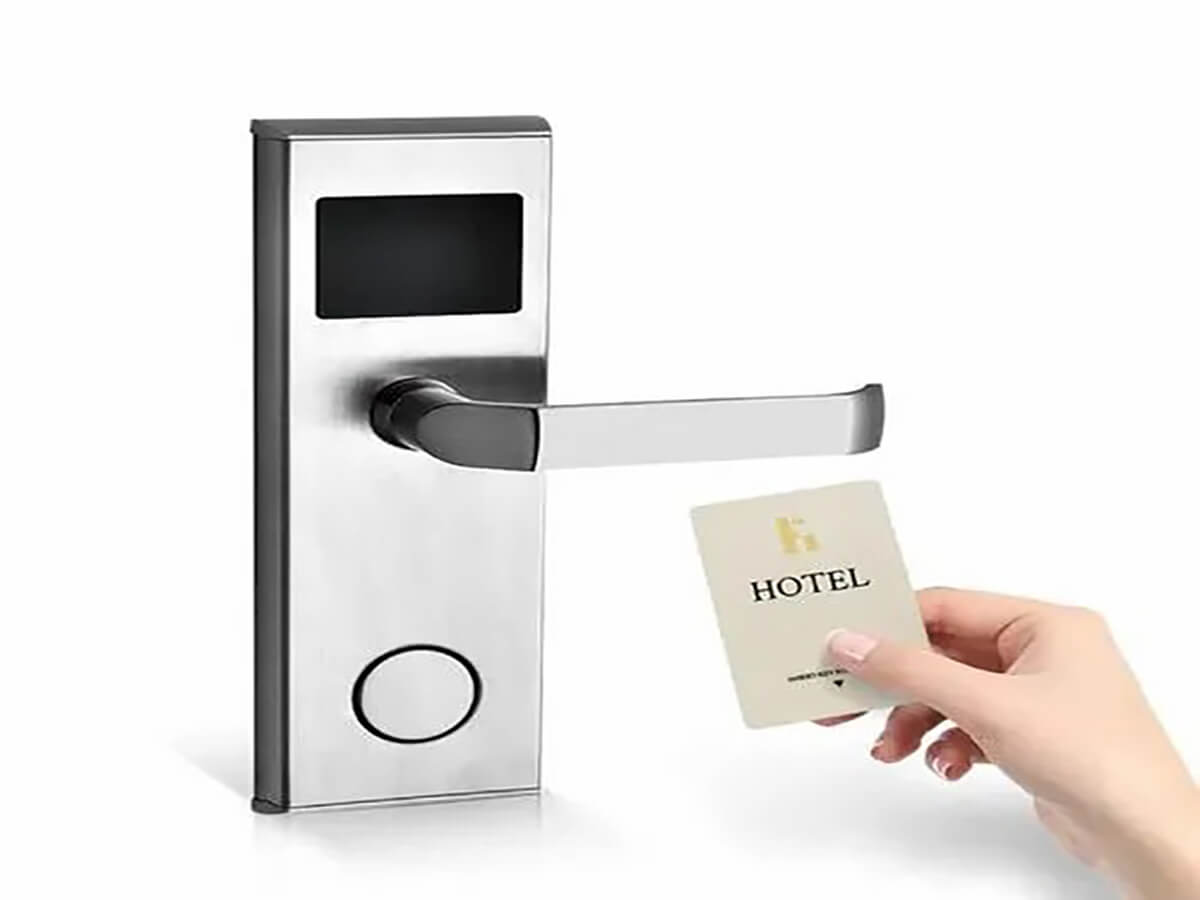
3) Electromechanical hotel door lock
The electromechanical door lock combines the functions of a mechanical door lock and an electronic door lock. This kind of lock does not need to be connected to a power source, it only needs a battery for the power supply, and it is easy to replace. If the locking system has a Bluetooth connection, you can get the latest information about entering the building or room where the lock is located.
Advantage
- Greater flexibility compared to mechanical door locks
- Replacement keys can be programmed if desired
- Easily adjust access settings
- Allow locked access for a defined period of time
- Keys can be removed from the system if they have been stolen or lost
- Quick to install and additional retrofits possible
- Event log save function
Shortcoming
- Higher installation and maintenance costs compared to traditional mechanical door locks
4. The importance of hotel door lock system
If you are a hotel owner, choosing the right hotel lock system is very important for you. Once a guest has checked into a hotel, hotel staff, and security teams are often tasked with keeping numerous guests safe at any given time. For example, in the event of a fire, break-in, or other physical threat, staff must be able to quickly and reliably check on all guests and ensure that all exits are open. Private spaces and potentially dangerous locations such as server rooms and maintenance areas must also be reliably protected. At this time, the importance of the hotel door lock system is reflected.
A perfect hotel locking system should allow staff to set multiple permissions for different areas of the hotel. For example, the keys available to guests must only unlock the guest’s private rooms, as well as pre-approved public areas and a selection of on-site amenities. In addition, you must work hard to ensure that guests’ keys cannot be copied, stolen, or hacked to reduce the chance of theft. Minimize the costs associated with changing keys and ensure a reasonable level of personal security for guests and their belongings.
Businesses with larger hotels may want to install electronic locks, such as a mobile credential system. Guest permissions can be viewed and adjusted remotely, and guests can access additional in-app features such as remote check-in, amenity reservation services, and customer support through this type of commercial hotel door lock system. However, smaller B&Bs or motels may find these solutions cost-prohibitive, so a PIN lock or smart hotel key lock system used with a strong visitor management policy may be a better fit.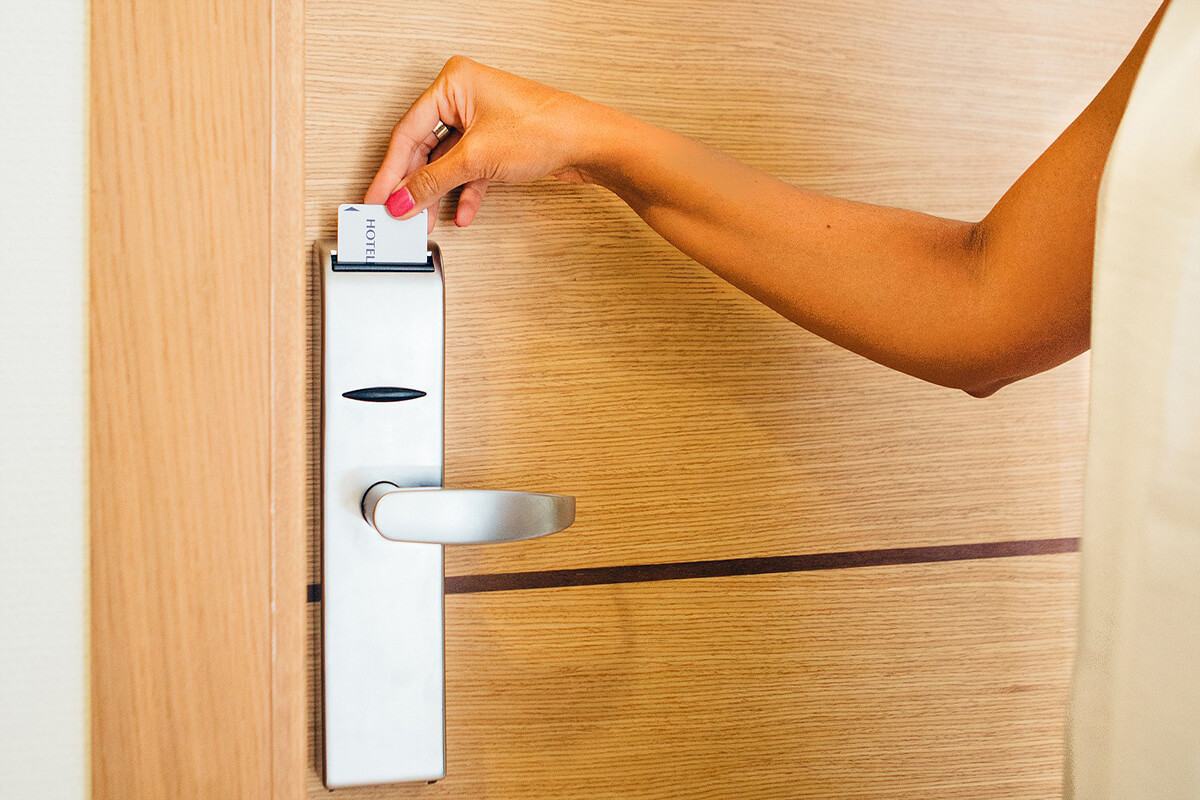
5. Types of hotel door lock
There are many kinds of hotel door locks, according to the needs and budget of the hotel, you can choose different types of hotel door locks
1) Keyless door lock
In recent years, more and more hoteliers have been using keyless door-locking systems. This greatly simplifies the check-in process for guests and increases staff productivity. With the help of a specially programmed mobile app and Bluetooth connectivity, keyless door locks verify access credentials with keyless access readers. A smartphone app generates digital keys that allow guests to open doors they are authorized to enter.
Then, when the guest checks out, their access will be revoked. The system can even set up self-service check-in/check-out and contactless payment processes for customers. This offers a wide range of advantages to small and large businesses looking to better handle late arrivals and early departures. A keyless hotel door lock should be compatible with the various mobile devices and access devices already installed in the hotel. Hotel owners should train staff to explain the system to hotel guests and use mobile app technology, which can provide helpful assistance to guests should they encounter technical issues.
According to the survey, many well-known hotels currently use keyless door lock systems. Examples include Hilton, MGM Resorts, Disney Hotels, and Marriott International.
2) RFID hotel door lock system
Generally, commercial hotel door locks with key card access use RFID technology, where digital credentials are stored on a physical card. It works because when a guest holds an RFID card close to a reader mounted on the door, the digital credential is transmitted via radio waves. If the data sent matches a specific code stored in the connected database, the door lock will open to granting access. From here guests enter the room.
At present, the RFID hotel door lock system is the most commonly used door lock system in major hotels. Because the guest can open the room with a key card and the purchase cost of the key card is low. Keycards can be deactivated remotely if guests lose their keycards or check out without handing them in. However, since the RFID hotel door lock system relies on power, the door will remain locked if the power is interrupted. In addition, hackers may use tools to copy the data inside the key card.
3) Hotel keypad door lock
Keypad door locks will be equipped with a numeric keypad interface for managing access and will issue guests a unique PIN code that will unlock the door when the guest enters the keypad reader. Hotel keypad locks are often used in guest amenity spaces like resort pools and gyms, or front door locks in vacation rentals. Administrators can remotely control user credentials and instantly revoke PINs to address potential security threats. And access data can be monitored for easy management.
However, since the PIN code is the only credential, the customer needs to remember the PIN code firmly. In addition, if the wireless network is not secure, it may be hacked.
4) IC chip card
IC chip cards generally refer to plastic cards with integrated circuit chips. In the past decade, IC chip cards have generally been found in credit cards and debit cards. Today, this technology is also used in hotel door lock systems due to its programmability and ease of use. Guests can enter the room and other guest areas by inserting the card into the slit in the door lock. Then, when the guest checks out, the card is replaced and access is reset for the next registered guest. But the only disadvantage is that the IC card is only the size of a credit card and is easy to lose.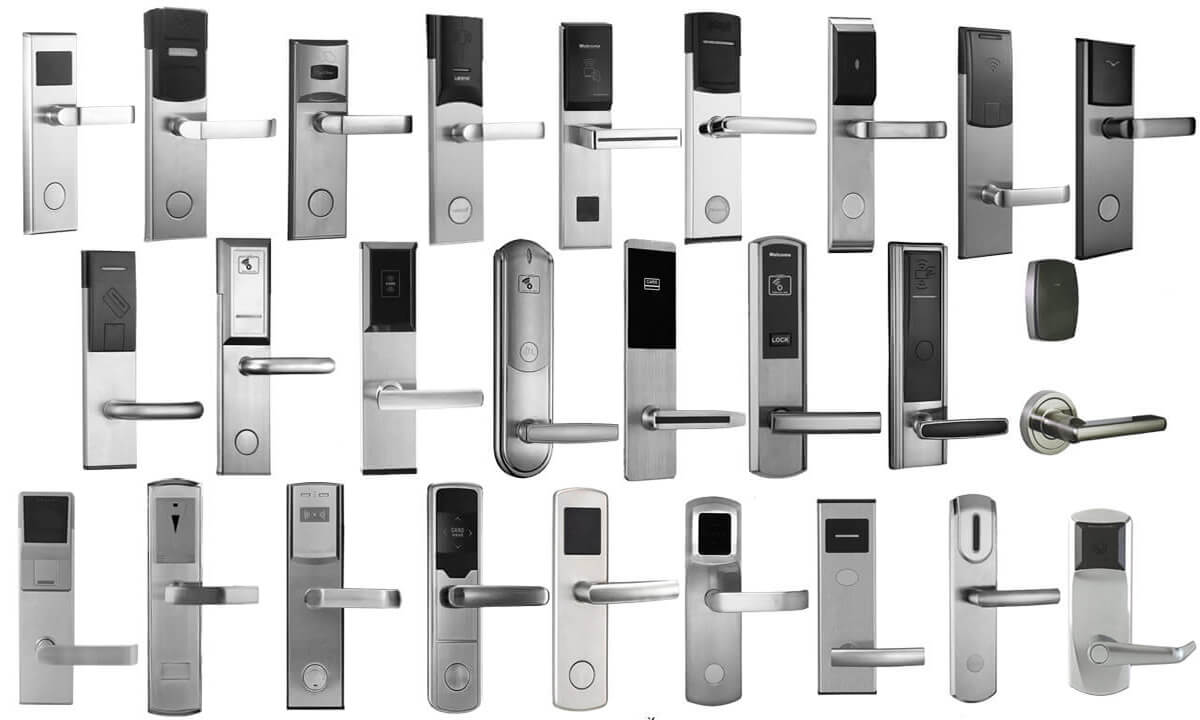
6. How to use the hotel room door lock to keep guests safe
If you are staying alone in a hotel, for maximum hotel room security, use all the locks provided, carry a portable door lock for extra security, and be vigilant about who may have access to your room.
1) How to use the deadbolt and safety chain correctly
Latches and safety chains are two types of locks commonly found in hotel rooms. In order for it to be valid, please ensure the following:
- Door locks: Be sure to lock the door locks when you are in the room. This adds an extra layer of security to the standard lock on the door handle. Remember to lock the deadbolt whenever you leave the room.
- Safety Chain: Use a safety chain whenever you answer the door. This allows you to partially open the door while maintaining a level of security. Remember that security chains are not meant to be the only protection; they are meant to provide a barrier that allows you to verify the identity of the person at the door before opening the door fully.
2) Carry a portable door lock
A portable door lock is a small device that can be easily carried in a suitcase or pocket. Designed to give you peace of mind when sleeping or leaving your hotel room unattended, it provides an extra lock for your hotel room door. These locks are usually made of strong materials such as stainless steel and are easy to install, and you can easily buy them online or in your home. When you’re staying in a hotel, you can attach them to your door handle or latch to prevent anyone from opening the door from the outside. Some portable door locks even have an alarm function that will sound an alarm if someone tries to pick the lock.
3) Keep your room key safe
One of the most important things you can do to enhance the security of your hotel room is to secure your room key. Make sure you don’t leave it lying around or in plain sight when you leave the room. Best to keep it with you at all times, whether in a secure pocket or in a small carry-on bag. If you lose your room key, please notify hotel staff immediately so they can take appropriate steps to ensure your safety.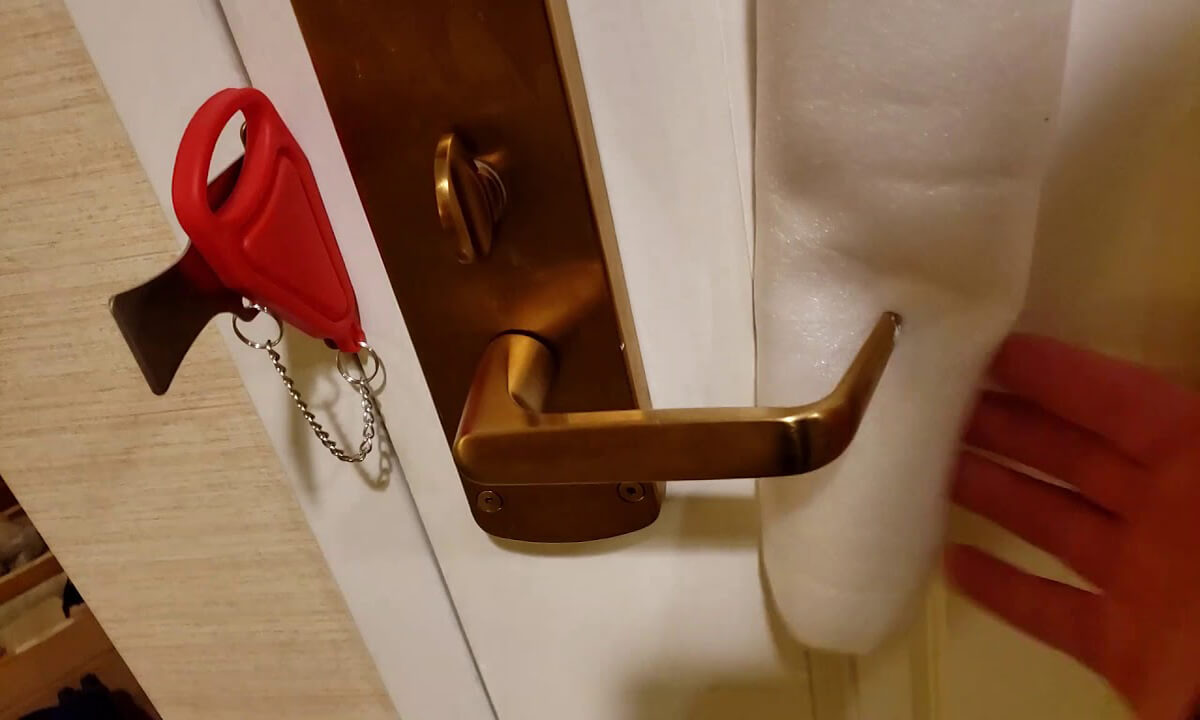
7. The practical application of hotel locks
Any industry must adhere to a set of building codes and industry regulations, so we’ll walk you through some common use cases for hotel door locks in hotels, as well as the general guidelines staff must follow when using locks to secure certain areas.
1) External entrance
In most cases, all doors that are part of an exit passage must be opened at one time. These doors must also be operable from the exit side without keys, tools, special expertise, or effort by the operator, and without gripping, squeezing, or twisting the wrist. Additionally, the release hardware must be between 34 and 48 inches above the ground (or as required by your state or local jurisdiction).
2) Accommodation and rooms
It goes without saying that guest rooms and private dwellings must have doors that can be reliably closed and locked, and that can be locked with any key or digital credential (except emergency keys) other than the key or digital credential issued to the guest. In most areas, rooms with fewer than 10 occupants will be permitted to use deadbolts as additional locks, provided the device does not require a tool to unlock.
Check the battery level frequently if you choose a wireless keyless hotel room lock system and make sure it has backup power. Also, we recommend that you preferably use a system that automatically revokes guest access at checkout.
3) Meeting and meeting areas
Doors to gathering places of up to 50 people or more may not have locks or latches unless they are emergency hardware (fire exit hardware may not be installed if the door is fire-rated). Emergency hardware must be installed at all doorways on the exit path from the assembly space to the common area, as required.
4) Leisure resort facilities
There are certain types of lock systems that can be integrated with reservation services at hotels that have on-site amenities like pools and spas. For example, mobile credentials could be stored within the app, and customers would be able to upgrade access through the same platform. In addition, self-locking locks should be installed in these areas to prevent unattended children from breaking in and causing serious consequences. Exits should be equipped with emergency devices to aid evacuation.
Hotel door lock systems can also help enhance 24/7 security at resort facilities. Resort door locks and access control can be programmed to remain locked when the facility is closed and ensure only authorized guests can enter during operating hours.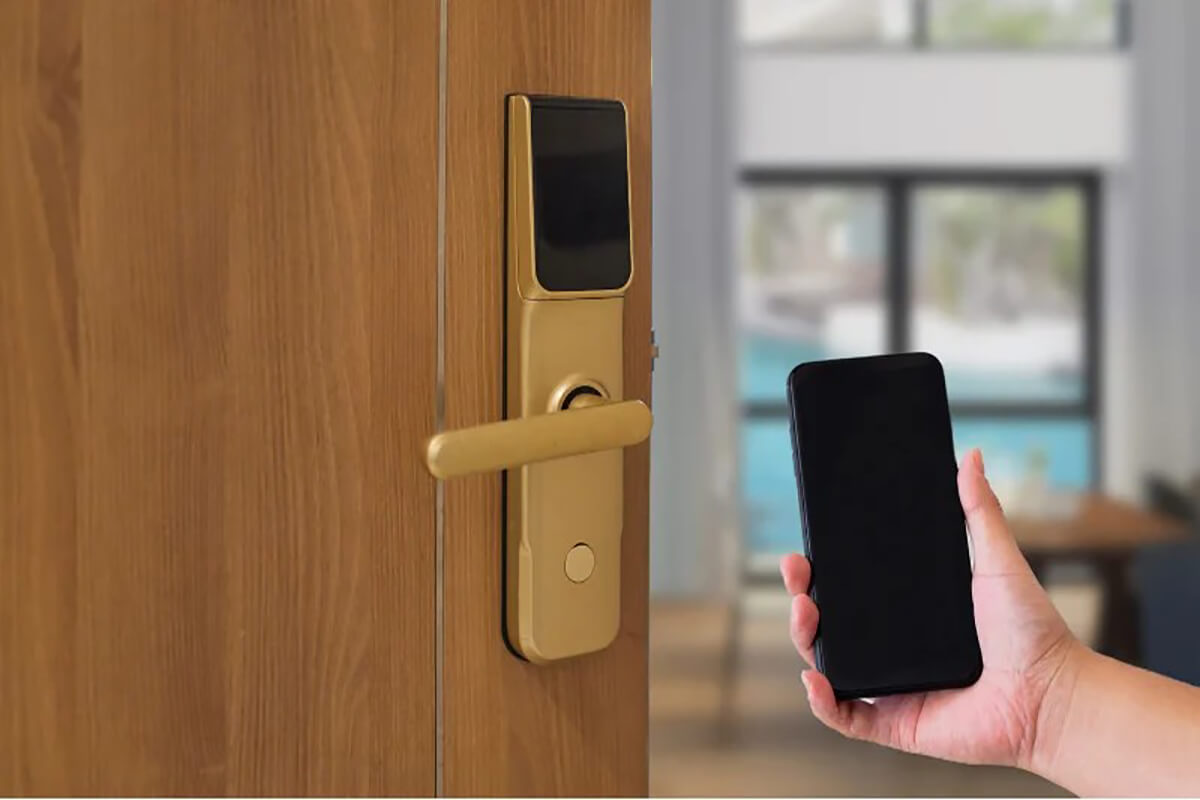
5) Stairwell doors
In most cases, stairwell doors must be fire-rated door assemblies. This means they must close and lock automatically to protect escape routes. If the stairwell door can be locked on the side of the staircase to prevent access from one floor to the other, then in the event of a fire, the door must be automatically unlocked to allow building occupants to exit if any floor is affected by flames and smoke.
6) Service rooms and areas
Building and security laws also require doors connecting rooms and passageways to comply. They are usually required to meet the classification of fire doors or emergency exit doors. Remember that exit routes must be kept clear so that exit routes can be used in an emergency.
7) Inspection and maintenance
Fire codes in most states in the United States require maintenance of fire door assemblies in accordance with NFPA 80. It is the building owner’s or property manager’s responsibility to ensure that all fire door assemblies are in code-compliant condition and that any damaged components or defects must be repaired as soon as possible.
8. Conclusion
As a hotel owner, it is very important to find and use the most suitable door lock for the hotel. I hope this hotel door lock guide can help you. If you have any questions about hotel door locks, please feel free to contact iLockey.

